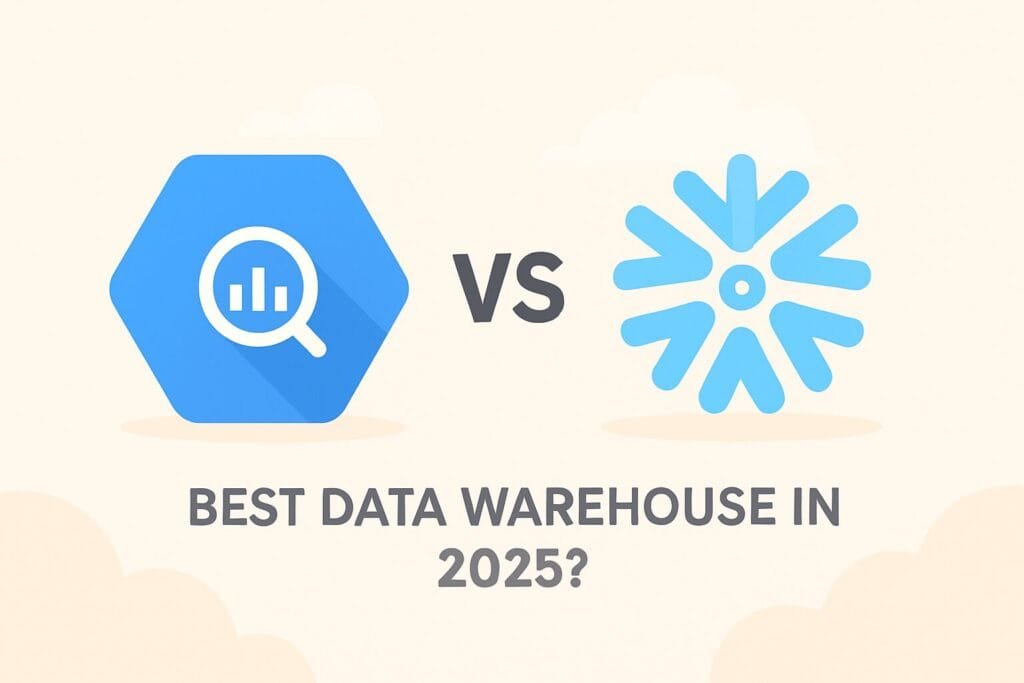As we move deeper into 2025, the competition between Google BigQuery and Snowflake continues to shape the modern data warehouse landscape. Both platforms have proven their reliability and scalability, but choosing the right one for your organization depends on performance, pricing, integration, and ecosystem compatibility. In this article, we’ll dive deep into a detailed comparison of BigQuery vs Snowflake to help you decide which is the best data warehouse in 2025.

1. Overview of BigQuery and Snowflake
Google BigQuery is a fully managed, serverless data warehouse solution developed by Google Cloud Platform (GCP). It’s designed to handle massive analytical workloads and offers seamless integration with Google tools such as Looker Studio, Vertex AI, and Cloud Storage.
Snowflake, on the other hand, is an independent cloud-based data platform that runs on multiple cloud providers (AWS, Azure, and GCP). Snowflake is known for its elasticity, multi-cloud capability, and efficient data sharing architecture.
2. Key Features Comparison
| Feature | BigQuery | Snowflake |
|---|---|---|
| Deployment | Serverless and fully managed by Google Cloud | Managed cloud service deployed on AWS, Azure, and GCP |
| Pricing Model | Pay-per-query (on-demand) or flat-rate model | Pay-for-compute and storage separately (per-second billing) |
| Performance Optimization | Automatic query optimization using Dremel technology | Virtual warehouses with customizable compute scaling |
| Data Storage | Columnar storage managed by Google | Compressed columnar storage on multiple clouds |
| Integration Ecosystem | Tight integration with Google products and Looker | Integrates easily with AWS, Azure, Databricks, and Tableau |
| Multi-Cloud Support | Single-cloud (Google Cloud only) | Multi-cloud (AWS, Azure, GCP) |
| Security & Compliance | Encryption at rest and in transit, IAM, VPC Service Controls | End-to-end encryption, role-based access control, GDPR, HIPAA |
3. Performance and Scalability
When it comes to performance, BigQuery leverages Google’s infrastructure to deliver near-instant query execution for large-scale datasets. Its serverless architecture eliminates the need for manual resource provisioning, automatically scaling with demand. Snowflake, meanwhile, provides high performance through its “virtual warehouse” system — users can scale compute resources up or down depending on workload intensity.
In practice, BigQuery is ideal for ad-hoc analytics and AI-driven workflows, while Snowflake shines in hybrid or multi-cloud environments that require customizable compute power.
4. Pricing Comparison
Pricing often determines the choice between BigQuery and Snowflake. BigQuery uses a pay-per-query model, charging users only for the amount of data processed. For predictable workloads, Google also offers a flat-rate plan for dedicated slots.
Snowflake separates compute and storage costs, billing per-second usage of virtual warehouses. This flexibility allows organizations to optimize costs based on project-specific needs but can also lead to higher bills if not managed carefully.
5. Data Sharing and Collaboration
Snowflake’s standout feature is its data sharing capability. It allows organizations to share datasets securely across different accounts and regions without data duplication. BigQuery offers similar capabilities through its Data Clean Room and Analytics Hub, but Snowflake remains slightly ahead in ease of collaboration.
6. Ecosystem and Integration
BigQuery integrates natively with Google tools like Vertex AI, Cloud Run, and Looker Studio, making it the go-to choice for companies already invested in GCP. Snowflake, however, is more flexible for multi-cloud strategies, working seamlessly with third-party tools like Tableau, Power BI, and Apache Spark.
7. Which One Should You Choose in 2025?
If your business is already built around Google Cloud and requires seamless AI/ML integrations, BigQuery remains a powerful and cost-effective solution. However, if your organization prefers multi-cloud flexibility, scalable compute options, and enterprise-grade data sharing, Snowflake may offer better value in 2025.
Summary of Recommendation
- Choose BigQuery if you prioritize simplicity, serverless scaling, and Google ecosystem integration.
- Choose Snowflake if you need flexibility, multi-cloud support, and advanced collaboration features.
8. External Reference
For more in-depth performance metrics and benchmarks, you can read the official comparison guide from Google Cloud BigQuery Documentation.
9. Conclusion
In 2025, both BigQuery and Snowflake stand as industry leaders in data warehousing. The best choice depends on your specific business goals — whether it’s analytics speed, cloud flexibility, or ecosystem integration. Ultimately, BigQuery’s serverless innovation and Snowflake’s multi-cloud versatility ensure that both remain top contenders for enterprise data strategies in the years to come.

